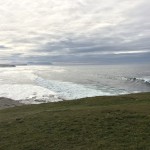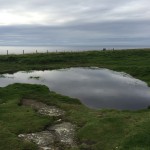Orkney is great for many reasons. Another one of these I have come across this week is the participation of Orcadians in the ORCADES study (ORCADES standing for the Orkney Complex Disease Study). This is a genetic epidemiological study based out of Edinburgh that is looking to identify genes and variants of Orcadians that are associated with common diseases that are seen here on the Orkney Isles. There are over 2000 Orcadians who participate in this study, with eligibility criteria being that subjects must be descendants of two Orcadian grandparents.
One condition that this study is particularly interested in is Multiple Sclerosis (MS). The Orkney Isles has the highest prevalence of MS  in the world. Compared with New Zealand where the prevalence of MS is around 72 people per 100,000, in Orkney the incidence is 401 per 100,000. Women are affected at a higher rate than men with estimates of the prevalence being 1 in every 172 women in Orkney. Nobody has put a finger on why there is such a high incidence of MS here. It is known that MS has a latitude gradient associated with its prevalence (ie. the further away from the equator, the higher the prevalence). Some investigators have previously speculated that there is an association between UV exposure and/or vitamin D levels and MS incidence given its latitudinal trend. The ORCADES study provides a perfect population to try and tease out these relationships that have been postulated. The most recent study out of the ORCADES group showed that people in Orkney have similar if not higher levels of Vitamin D than those on mainland Scotland (1). And whilst there is probably a large range of vitamin D levels within the population here the Vitamin D association to MS may not be as strong as once thought.
in the world. Compared with New Zealand where the prevalence of MS is around 72 people per 100,000, in Orkney the incidence is 401 per 100,000. Women are affected at a higher rate than men with estimates of the prevalence being 1 in every 172 women in Orkney. Nobody has put a finger on why there is such a high incidence of MS here. It is known that MS has a latitude gradient associated with its prevalence (ie. the further away from the equator, the higher the prevalence). Some investigators have previously speculated that there is an association between UV exposure and/or vitamin D levels and MS incidence given its latitudinal trend. The ORCADES study provides a perfect population to try and tease out these relationships that have been postulated. The most recent study out of the ORCADES group showed that people in Orkney have similar if not higher levels of Vitamin D than those on mainland Scotland (1). And whilst there is probably a large range of vitamin D levels within the population here the Vitamin D association to MS may not be as strong as once thought.
In other interesting statistics I have read or learnt about so far:
– Orkney is the best place in the UK for children to go to school in terms of teachers per child in classrooms and funding per child
– Orkney has the happiest women in Scotland according to UK ‘happiness’ measures. I was informed recently that the magazine Cosmo has ran a feature regarding the happiness of woman here in Orkney.
– Orkney has the highest prevalence of obesity in Scotland at ~30%
I find it really fascinating these population studies that are being done in little pockets around the world. The Dunedin study is much further down the longitudinal line than this one and the results that have been born out of that study are fantastic. I hope that similar advances can be found from the ORCADES study.
References:
1. http://journals.plos.org/plosone/article?id=10.1371/journal.pone.0155633

1 Comment to 'ORCADES'
October 16, 2016
I am very intrestet abot what is the normal diet,what do people normaly eat and drink,because ms is known in TCM Medizine an low imunity problem.artificial flavoring Glutamat,Aspartam,and other chemicals.I am also intrestet in theyr Work, envirement,do people use hi conzentrate of pesticide, funizide,herbicide etc.and want to know about theyr social activities,and the climat.
Leave a comment